福建省福州八中2016届高三上学期第二次质量检测考试英语试卷
- 格式:doc
- 大小:127.50 KB
- 文档页数:14
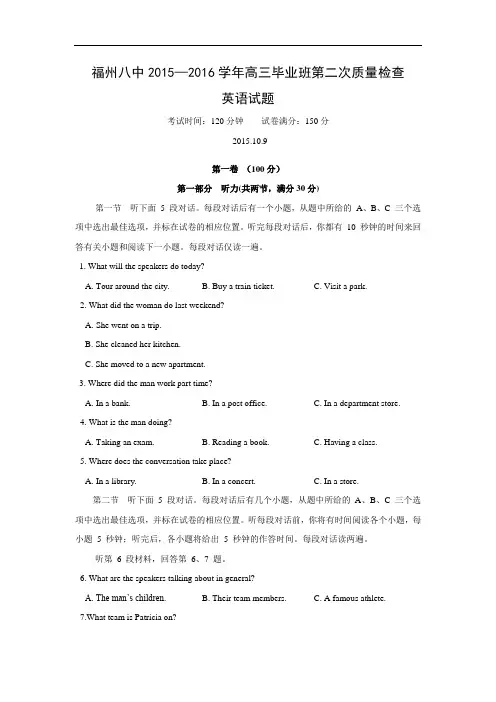
福州八中2015—2016学年高三毕业班第二次质量检查英语试题考试时间:120分钟试卷满分:150分2015.10.9第一卷(100分)第一部分听力(共两节,满分30分)第一节听下面5 段对话。
每段对话后有一个小题,从题中所给的A、B、C 三个选项中选出最佳选项,并标在试卷的相应位置。
听完每段对话后,你都有10 秒钟的时间来回答有关小题和阅读下一小题。
每段对话仅读一遍。
1. What will the speakers do today?A. Tour around the city.B. Buy a train ticket.C. Visit a park.2. What did the woman do last weekend?A. She went on a trip.B. She cleaned her kitchen.C. She moved to a new apartment.3. Where did the man work part time?A. In a bank.B. In a post office.C. In a department store.4. What is the man doing?A. Taking an exam.B. Reading a book.C. Having a class.5. Where does the conversation take place?A. In a library.B. In a concert.C. In a store.第二节听下面5 段对话。
每段对话后有几个小题,从题中所给的A、B、C 三个选项中选出最佳选项,并标在试卷的相应位置。
听每段对话前,你将有时间阅读各个小题,每小题5 秒钟;听完后,各小题将给出5 秒钟的作答时间。
每段对话读两遍。
听第 6 段材料,回答第6、7 题。
6. What are the speakers talking about in general?A. The man’s children.B. Their team members.C. A famous athlete.7.What team is Patricia on?A. The swim team.B. The basketball team.C. The dancing team.听第7 段材料,回答第8、9 题。
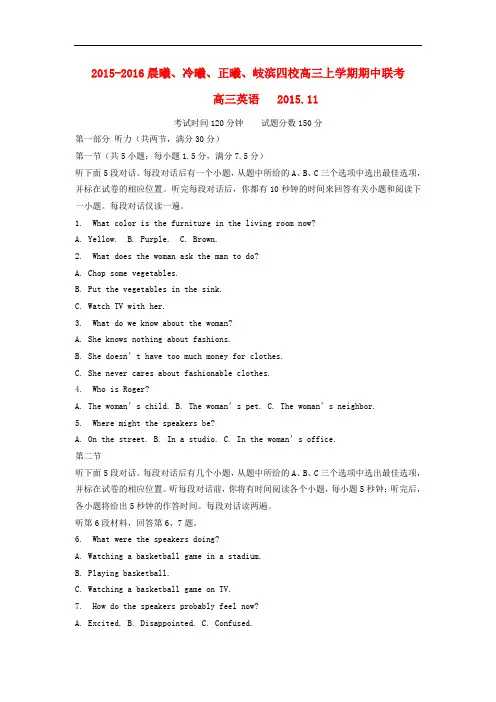
2015-2016晨曦、冷曦、正曦、岐滨四校高三上学期期中联考高三英语 2015.11考试时间120分钟试题分数150分第一部分听力(共两节,满分30分)第一节(共5小题;每小题1.5分,满分7.5分)听下面5段对话。
每段对话后有一个小题,从题中所给的A、B、C三个选项中选出最佳选项,并标在试卷的相应位置。
听完每段对话后,你都有10秒钟的时间来回答有关小题和阅读下一小题。
每段对话仅读一遍。
1. What color is the furniture in the living room now?A. Yellow.B. Purple.C. Brown.2. What does the woman ask the man to do?A. Chop some vegetables.B. Put the vegetables in the sink.C. Watch TV with her.3. What do we know about the woman?A. She knows nothing about fashions.B. She does n’t have too much money for clothes.C. She never cares about fashionable clothes.4. Who is Roger?A. The woman’s child.B. The woman’s pet.C. The woman’s neighbor.5. Where might the speakers be?A. On the street.B. In a studio.C. In the woman’s of fice.第二节听下面5段对话。
每段对话后有几个小题,从题中所给的A、B、C三个选项中选出最佳选项,并标在试卷的相应位置。
听每段对话前,你将有时间阅读各个小题,每小题5秒钟;听完后,各小题将给出5秒钟的作答时间。
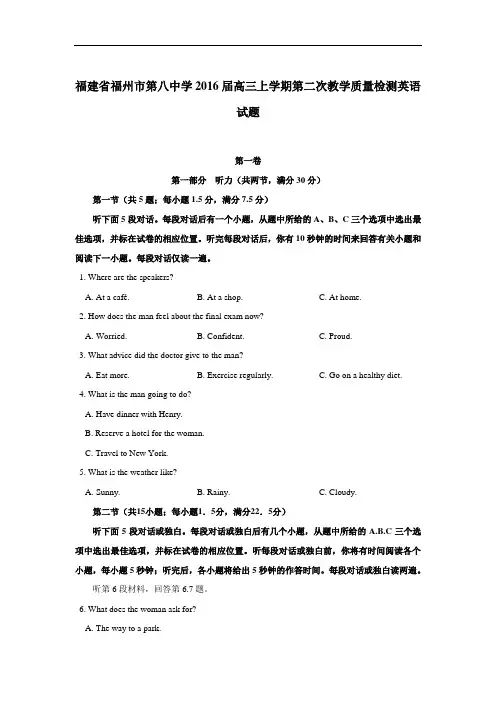
福建省福州市第八中学2016届高三上学期第二次教学质量检测英语试题第一卷第一部分听力(共两节,满分30分)第一节(共5题;每小题1.5分,满分7.5分)听下面5段对话。
每段对话后有一个小题,从题中所给的A、B、C三个选项中选出最佳选项,并标在试卷的相应位置。
听完每段对话后,你有10秒钟的时间来回答有关小题和阅读下一小题。
每段对话仅读一遍。
1. Where are the speakers?A. At a café.B. At a shop.C. At home.2. How does the man feel about the final exam now?A. Worried.B. Confident.C. Proud.3. What advice did the doctor give to the man?A. Eat more.B. Exercise regularly.C. Go on a healthy diet.4. What is the man going to do?A. Have dinner with Henry.B. Reserve a hotel for the woman.C. Travel to New York.5. What is the weather like?A. Sunny.B. Rainy.C. Cloudy.第二节(共15小题;每小题1.5分,满分22.5分)听下面5段对话或独白。
每段对话或独白后有几个小题,从题中所给的A.B.C三个选项中选出最佳选项,并标在试卷的相应位置。
听每段对话或独白前,你将有时间阅读各个小题,每小题5秒钟;听完后,各小题将给出5秒钟的作答时间。
每段对话或独白读两遍。
听第6段材料,回答第6.7题。
6. What does the woman ask for?A. The way to a park.B. The exit of a theatre.C. The parking place.7. Where is the sign?A. Around the corner.B. Behind a tree.C. Beside a car.听第7段材料,回答第8至9题。
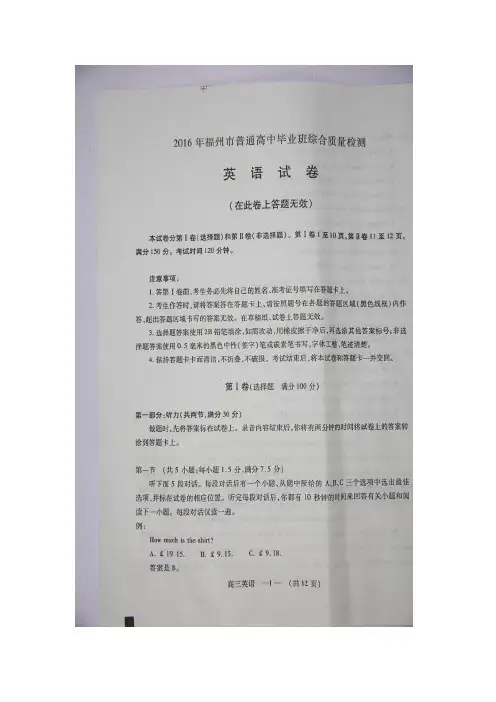
2016年福州市普通高中毕业班综合质量检测英语听力材料这是高三英语听力试题听力部分。
该部分分为第一、第二两节。
注意:回答听力部分时, 请先将答案标在试卷上。
听力部分结束前, 你将有两分钟的时间将你的答案转涂到客观题答题卡上。
现在是听力试音时间。
停顿00′5″M: Hello. International Friends Club. Can I help you?W: Oh, hello. I read about your club in the paper today and I thought I’d phone to find out a bit more.M: Yes, certainly, well, we’re a sort of social club for people from different countries. It’s quite a new club — we have about 50 members at the moment, but we’re growing all the time.W: That sounds interesting.试音到此结束。
听力考试正式开始。
停顿00′5″请看听力部分第一节。
第一节听下面5 段对话。
每段对话后有一个小题,从题中所给的A、B、C 三个选项中选出最佳选项,并标在试卷的相应位置。
听完每段对话后,你都有10 秒钟的时间来回答有关小题和阅读下一小题。
每段对话仅读一遍。
例如,现在, 你有5秒钟的时间看试卷上的例题,你将听到以下内容:M: Excuse me, can you tell me how much the shirt is?W: Yes, it’s nine fifteen.你将有5秒钟的时间将正确答案标在试卷上。
衬衫的价格为9镑15便士。
所以,你选择B项,并将其划在试卷上。
现在, 你有5秒钟的时间阅读第1小题的有关内容。
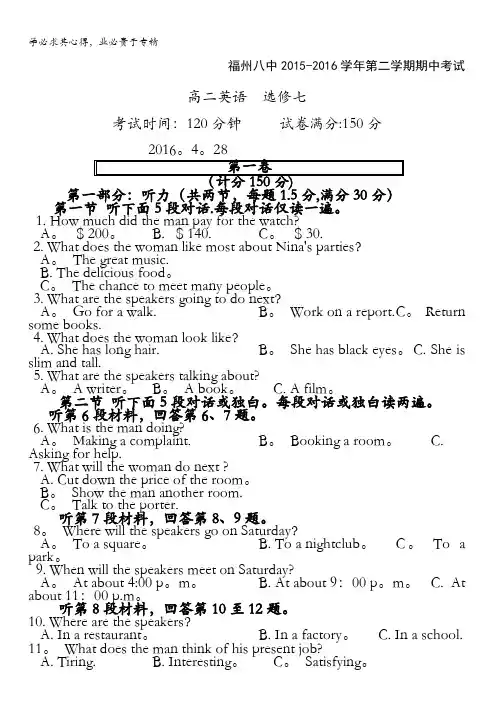
学必求其心得,业必贵于专精福州八中2015-2016学年第二学期期中考试高二英语选修七考试时间:120分钟试卷满分:150分2016。
4。
28第一卷(计分150分)第一部分:听力(共两节,每题1.5分,满分30分)第一节听下面5段对话.每段对话仅读一遍。
1. How much did the man pay for the watch?A。
$200。
B. $140. C。
$30.2. What does the woman like most about Nina's parties?A。
The great music.B. The delicious food。
C。
The chance to meet many people。
3. What are the speakers going to do next?A。
Go for a walk. B。
Work on a report. C。
Return some books.4. What does the woman look like?A. She has long hair. B。
She has black eyes。
C. She is slim and tall.5. What are the speakers talking about?A。
A writer。
B。
A book。
C. A film。
第二节听下面5段对话或独白。
每段对话或独白读两遍。
听第6段材料,回答第6、7题。
6. What is the man doing?A。
Making a complaint. B。
Booking a room。
C. Asking for help.7. What will the woman do next ?A. Cut down the price of the room。
B。
Show the man another room.C。
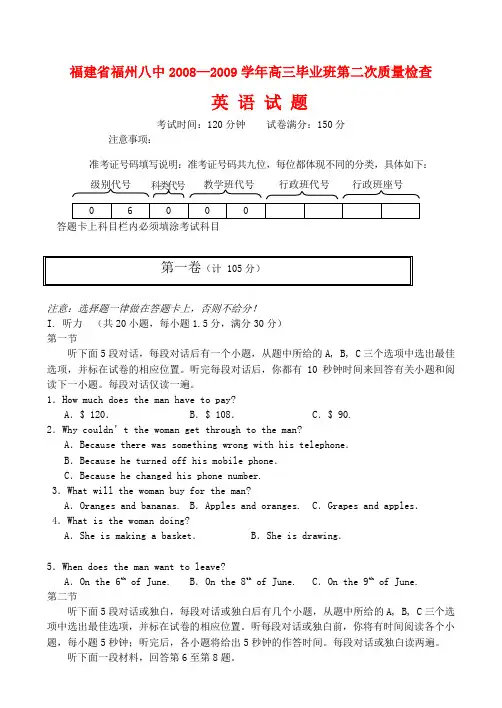
福建省福州八中2008—2009学年高三毕业班第二次质量检查英语试题考试时间:120分钟试卷满分:150分注意事项:准考证号码填写说明:准考证号码共九位,每位都体现不同的分类,具体如下:级别代号科类代号教学班代号行政班代号行政班座号答题卡上科目栏内必须填涂考试科目注意:选择题一律做在答题卡上,否则不给分!I. 听力(共20小题,每小题1.5分,满分30分)第一节听下面5段对话,每段对话后有一个小题,从题中所给的A, B, C三个选项中选出最佳选项,并标在试卷的相应位置。
听完每段对话后,你都有10秒钟时间来回答有关小题和阅读下一小题。
每段对话仅读一遍。
1.How much does the man have to pay?A.$ 120.B.$ 108.C.$ 90.2.Why couldn’t the woman get through to the man?A.Because there was something wrong with his telephone.B.Because he turned off his mobile phone.C.Because he changed his phone number.3.What will the woman buy for the man?A.Oranges and bananas. B.Apples and oranges. C.Grapes and apples.4.What is the woman doing?A.She is making a basket.B.She is drawing.5.When does the man want to leave?A.On the 6th of June. B.On the 8th of June. C.On the 9th of June.第二节听下面5段对话或独白,每段对话或独白后有几个小题,从题中所给的A, B, C三个选项中选出最佳选项,并标在试卷的相应位置。
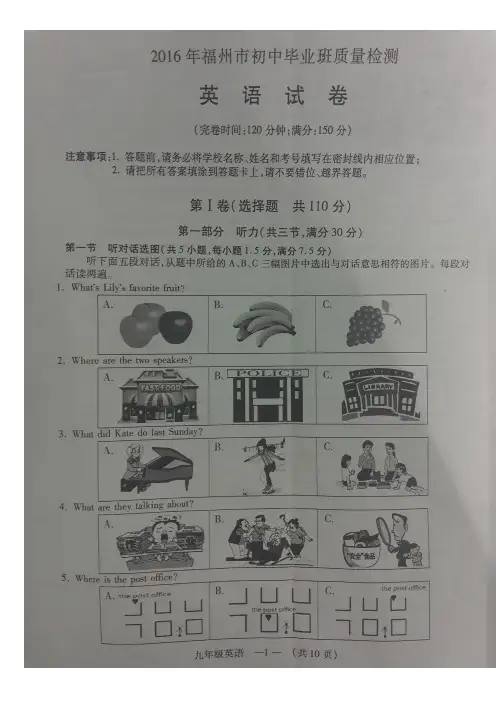
2016年福州市初中毕业班质量检测英语试卷听力材料第一节听对话选图听下面五段对话,从题中所给的A、B、C三幅图片中选出与对话意思相符的图片。
每段对话读两遍。
1.M:Lily,what kind of fruit do you like best?W:I like apples best.2.W:Keep quiet,please.It’s not allowed to talk in the library.M:I’m sorry,madam.3.M:Did you go skating last Sunday,Kate?W:No,I had a picnic with my family.4.M:I didn’t finish my homework until eleven o’clock last night.W:Neither did I.Too much homework makes me exhausted.5.M:Excuse me,how can I get to the post office?W:Go along this road and turn left at the first crossing.It’s on your left.第二节对话理解听下面七段对话,从题中所给的A、B、C三个选项中选出最佳选项。
每段对话读两遍。
听第一段对话,完成第6小题。
W:Look,the pandas seem very excited.M:Maybe they haven’t seen such a heavy snow before.听第二段对话,完成第7小题。
M:Hello!This is Michael.May I speak to Emma?W:Sorry!She is taking a bath.听第三段对话,完成第8小题。
W:I hear the food in this restaurant is delicious.Is it really as delicious as people say?M:Yeah.But I think it used to be even better.听第四段对话,完成第9小题。
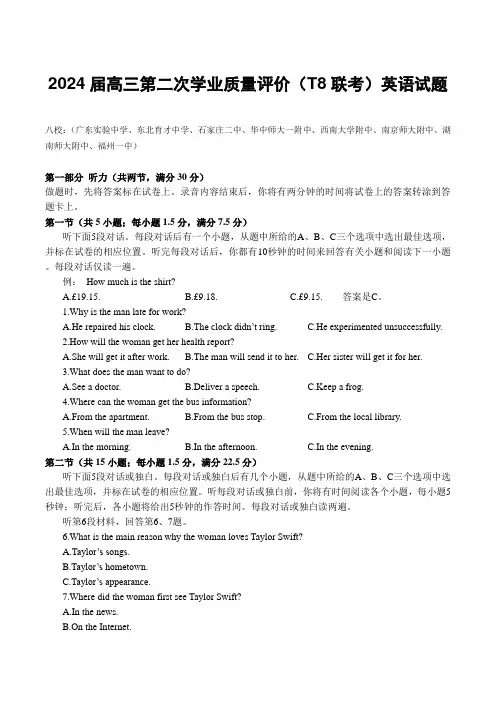
2024届高三第二次学业质量评价(T8联考)英语试题八校:(广东实验中学、东北育才中学、石家庄二中、华中师大一附中、西南大学附中、南京师大附中、湖南师大附中、福州一中)第一部分听力(共两节,满分30分)做题时,先将答案标在试卷上。
录音内容结束后,你将有两分钟的时间将试卷上的答案转涂到答题卡上。
第一节(共5小题;每小题1.5分,满分7.5分)听下面5段对话。
每段对话后有一个小题,从题中所给的A、B、C三个选项中选出最佳选项,并标在试卷的相应位置。
听完每段对话后,你都有10秒钟的时间来回答有关小题和阅读下一小题。
每段对话仅读一遍。
例:How much is the shirt?A.£19.15.B.£9.18.C.£9.15. 答案是C。
1.Why is the man late for work?A.He repaired his clock.B.The clock didn’t ring.C.He experimented unsuccessfully.2.How will the woman get her health report?A.She will get it after work.B.The man will send it to her.C.Her sister will get it for her.3.What does the man want to do?A.See a doctor.B.Deliver a speech.C.Keep a frog.4.Where can the woman get the bus information?A.From the apartment.B.From the bus stop.C.From the local library.5.When will the man leave?A.In the morning.B.In the afternoon.C.In the evening.第二节(共15小题;每小题1.5分,满分22.5分)听下面5段对话或独白。
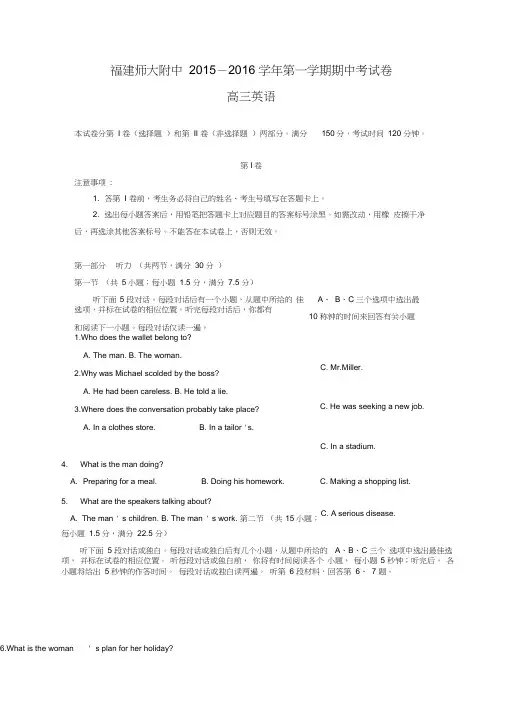
6.What is the woman ' s plan for her holiday?福建师大附中 2015-2016 学年第一学期期中考试卷高三英语本试卷分第 I 卷(选择题 )和第 II 卷(非选择题 )两部分。
满分 150分,考试时间 120 分钟。
第I 卷注意事项 :1. 答第 I 卷前,考生务必将自己的姓名、考生号填写在答题卡上。
2. 选出每小题答案后,用铅笔把答题卡上对应题目的答案标号涂黑。
如需改动,用橡 皮擦干净后,再选涂其他答案标号。
不能答在本试卷上,否则无效。
第一部分 听力 (共两节,满分 30 分 )第一节 (共 5小题;每小题 1.5 分,满分 7.5 分)听下面 5 段对话。
每段对话后有一个小题,从题中所给的 佳选项,并标在试卷的相应位置。
听完每段对话后,你都有和阅读下一小题。
每段对话仅读一遍。
4. What is the man doing?A. Preparing for a meal. 5. What are the speakers talking about?A. The man ' s children.B. The man ' s work. 第二节 (共 15小题;每小题 1.5分,满分 22.5 分)听下面 5 段对话或独白。
每段对话或独白后有几个小题,从题中所给的 A 、B 、C 三个 选项中选出最佳选项, 并标在试卷的相应位置。
听每段对话或独白前, 你将有时间阅读各个 小题, 每小题 5 秒钟;听完后, 各小题将给出 5 秒钟的作答时间。
每段对话或独白读两遍。
听第 6 段材料,回答第 6、 7 题。
A 、B 、C 三个选项中选出最 10 称钟的时间来回答有关小题 1.Who does the wallet belong to?A. The man.B. The woman.2.Why was Michael scolded by the boss?A. He had been careless.B. He told a lie.3.Where does the conversation probably take place?A. In a clothes store.B. In a tailor 's.C. ler. C. He was seeking a new job.C. In a stadium.B. Doing his homework.C. Making a shopping list.C. A serious disease.A. She will stick to a limited budget.B. She will be away for more than a week.C. She will do her work meanwhile. 7.What will the man do on holiday? A. Go shopping. B. Go sightseeing. 听第 7 段材料,回答第 8、9 题。
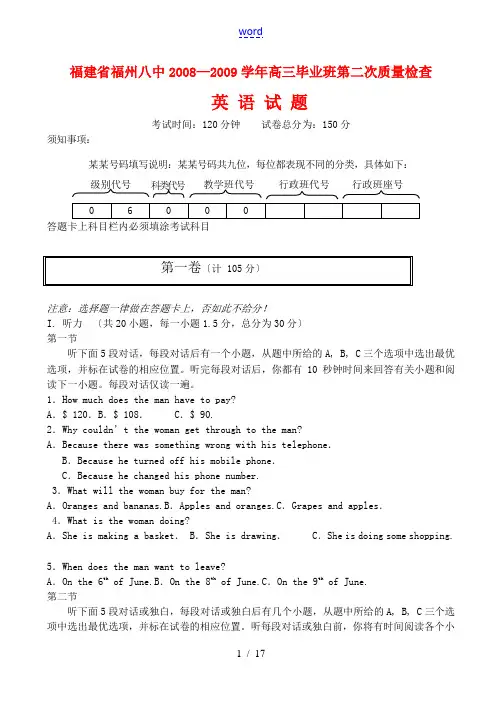
福建省福州八中2008—2009学年高三毕业班第二次质量检查英语试题考试时间:120分钟试卷总分为:150分须知事项:某某号码填写说明:某某号码共九位,每位都表现不同的分类,具体如下:级别代号科类代号教学班代号行政班代号行政班座号答题卡上科目栏内必须填涂考试科目注意:选择题一律做在答题卡上,否如此不给分!I. 听力〔共20小题,每一小题1.5分,总分为30分〕第一节听下面5段对话,每段对话后有一个小题,从题中所给的A, B, C三个选项中选出最优选项,并标在试卷的相应位置。
听完每段对话后,你都有10秒钟时间来回答有关小题和阅读下一小题。
每段对话仅读一遍。
1.How much does the man have to pay?A.$ 120.B.$ 108. C.$ 90.2.Why couldn’t the woman get through to the man?A.Because there was something wrong with his telephone.B.Because he turned off his mobile phone.C.Because he changed his phone number.3.What will the woman buy for the man?A.Oranges and bananas.B.Apples and oranges.C.Grapes and apples.4.What is the woman doing?A.She is making a basket. B.She is drawing.C.She is doing some shopping.5.When does the man want to leave?A.On the 6th of June.B.On the 8th of June.C.On the 9th of June.第二节听下面5段对话或独白,每段对话或独白后有几个小题,从题中所给的A, B, C三个选项中选出最优选项,并标在试卷的相应位置。
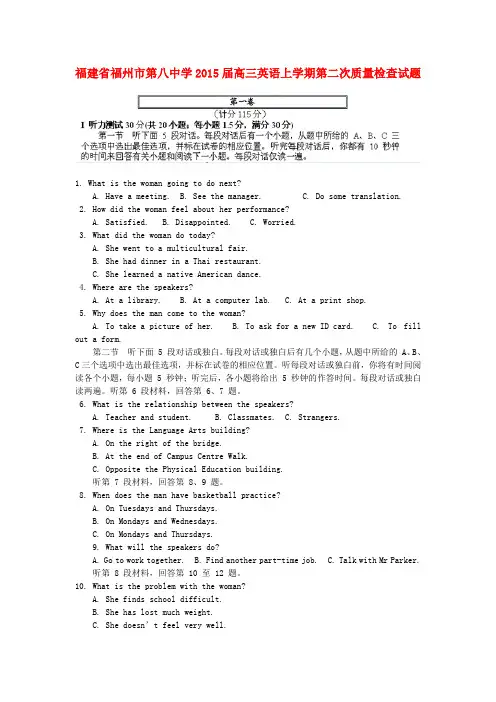
福建省福州市第八中学2015届高三英语上学期第二次质量检查试题1. What is the woman going to do next?A. Have a meeting.B. See the manager.C. Do some translation.2. How did the woman feel about her performance?A. Satisfied.B. Disappointed.C. Worried.3. What did the woman do today?A. She went to a multicultural fair.B. She had dinner in a Thai restaurant.C. She learned a native American dance.4. Where are the speakers?A. At a library.B. At a computer lab.C. At a print shop.5. Why does the man come to the woman?A. To take a picture of her.B. To ask for a new ID card.C. To fill out a form.第二节听下面 5 段对话或独白。
每段对话或独白后有几个小题,从题中所给的 A、B、C三个选项中选出最佳选项,并标在试卷的相应位置。
听每段对话或独白前,你将有时间阅读各个小题,每小题 5 秒钟;听完后,各小题将给出 5 秒钟的作答时间。
每段对话或独白读两遍。
听第 6 段材料,回答第 6、7 题。
6. What is the relationship between the speakers?A. Teacher and student.B. Classmates.C. Strangers.7. Where is the Language Arts building?A. On the right of the bridge.B. At the end of Campus Centre Walk.C. Opposite the Physical Education building.听第 7 段材料,回答第 8、9 题。
福州八中2015—2016学年高三毕业班第一次质量检查英语试题考试时间:120分钟试卷满分:150分2015.8.29第一卷(计分100分)第一部分听力(共两节,满分30分)第一节(共5题;每小题1.5分,满分7.5分)听下面5段对话。
每段对话后有一个小题,从题中所给的A、B、C三个选项中选出最佳选项,并标在试卷的相应位置。
听完每段对话后,你有10秒钟的时间来回答有关小题和阅读下一小题。
每段对话仅读一遍。
1. Where are the speakers?A. At a café.B. At a shop.C. At home.2. How does the man feel about the final exam now?A. Worried.B. Confident.C. Proud.3. What advice did the doctor give to the man?A. Eat more.B. Exercise regularly.C. Go on a healthy diet.4. What is the man going to do?A. Have dinner with Henry.B. Reserve a hotel for the woman.C. Travel to New York.5. What is the weather like?A. Sunny.B. Rainy.C. Cloudy.第二节(共15小题;每小题1.5分,满分22.5分)听下面5段对话或独白。
每段对话或独白后有几个小题,从题中所给的A.B.C三个选项中选出最佳选项,并标在试卷的相应位置。
听每段对话或独白前,你将有时间阅读各个小题,每小题5秒钟;听完后,各小题将给出5秒钟的作答时间。
每段对话或独白读两遍。
听第6段材料,回答第6.7题。
6. What does the woman ask for?A. The way to a park.B. The exit of a theatre.C. The parking place.7. Where is the sign?A. Around the corner.B. Behind a tree.C. Beside a car.听第7段材料,回答第8至9题。
福建省福州市第八中学2016-2017学年高二上学期期中考试英语试题Word版含答案福州八中2016—2017学年第一学期期中考试高二英语必修5第I卷(满分100分)第一部分:听力(共20小题;每小题1.5分,满分30分)第一节听下面5段对话。
每段对话后有一个小题,从题中所给的A、B、C三个选项中选出最佳选项,并标在试卷的相应位置。
听完每段对话后,你都有10秒钟的时间来回答有关小题和阅读下一小题。
每段对话仅读一遍。
1. How many eggs does the man order for breakfast?A. One.B. Two.C. Three.2. What does the woman agree to do?A. Visit Nelson tomorrow.B. Keep the party secret from Nelson.C. Arrange the party at the man’s house.3. How does the woman probably feel now?A. Happy.B. Unsure.C. Surprised.4. What will the woman do next week?A. Organize a family get-together.B. Give a presentation.C. Do research on wildlife.5. Where are the speakers?A. In a restaurant.B. In a shop.C. In a hotel.第二节听下面5段对话或独白。
每段对话或独白后有几个小题,从题中所给的A、B、C三个选项中选出最佳选项,并标在试卷的相应位置。
听每段对话或独白前,你将有时间阅读各个小题,每小题5秒钟;听完后,各小题给出5秒钟的作答时间。
每段对话或独白读两遍。
听第6段材料,回答第6、7题。
2015-2016晨曦、冷曦、正曦、岐滨四校高三上学期期中联考高三英语 2015.11考试时间120分钟试题分数150分第一部分听力(共两节,满分30分)第一节(共5小题;每小题1.5分,满分7.5分)听下面5段对话。
每段对话后有一个小题,从题中所给的A、B、C三个选项中选出最佳选项,并标在试卷的相应位置。
听完每段对话后,你都有10秒钟的时间来回答有关小题和阅读下一小题。
每段对话仅读一遍。
1. What color is the furniture in the living room now?A. Yellow.B. Purple.C. Brown.2. What does the woman ask the man to do?A. Chop some vegetables.B. Put the vegetables in the sink.C. Watch TV with her.3. What do we know about the woman?A. She knows nothing about fashions.B. She does n’t have too much money for clothes.C. She never cares about fashionable clothes.4. Who is Roger?A. The woman’s child.B. The woman’s pet.C. The woman’s neighbor.5. Where might the speakers be?A. On the street.B. In a studio.C. In the woman’s of fice.第二节听下面5段对话。
每段对话后有几个小题,从题中所给的A、B、C三个选项中选出最佳选项,并标在试卷的相应位置。
听每段对话前,你将有时间阅读各个小题,每小题5秒钟;听完后,各小题将给出5秒钟的作答时间。
福建省福州市2016届高三英语下学期第二次综合质量检测试题(扫描版)2016年福州市普通高中毕业班综合质量检测英语听力材料这是高三英语听力试题听力部分。
该部分分为第一、第二两节。
注意:回答听力部分时, 请先将答案标在试卷上。
听力部分结束前, 你将有两分钟的时间将你的答案转涂到客观题答题卡上。
现在是听力试音时间。
停顿00′5″M: Hello. International Friends Club. Can I help you?W: Oh, hello. I read about your club in the paper today and I thought I’d phone to find out a bit more.M: Yes, certainly, well, we’re a sort of social club for people from different countries. It’s quite a new club — we have about 50 members at the moment, but we’re growing all the time.W: That sounds interesting.试音到此结束。
听力考试正式开始。
停顿00′5″请看听力部分第一节。
第一节听下面 5 段对话。
每段对话后有一个小题,从题中所给的 A、B、C 三个选项中选出最佳选项,并标在试卷的相应位置。
听完每段对话后,你都有 10 秒钟的时间来回答有关小题和阅读下一小题。
每段对话仅读一遍。
例如,现在, 你有5秒钟的时间看试卷上的例题,你将听到以下内容:M: Excuse me, can you tell me how much the shirt is?W: Yes, it’s nine fifteen.你将有5秒钟的时间将正确答案标在试卷上。
衬衫的价格为9镑15便士。
福建省福州第八中学2015届高三英语上学期第二次质量检查试题(含解析)考试时间:120分钟试卷满分:150分第一卷II 单项填空(共15小题;每小题1分,满分15分)21. 一What do you think of the news related to you on the Internet,Mr Woods?一_______.A. No commentB. Thank youC.With pleasureD. All right22. ________ warm at night, I would fill the woodstove, then set my alarm clock formidnight so I could refill it.A. StayingB. StayedC. To stayD. Stay23. TV series Where Are We Going, Dad have made an _______ on kids since it was broadcaston Hunan TV.A. explanationB. investigationC. operationD. impression24. Nelson Mandela’s death may, in the short term, unite South Africa in ways_______have never been seen before.A. by whichB. thatC. in whichD. who25. ___ to advertisements constantly can help to change people's opinions over time.A. ExposedB. Being exposedC. ExposingD. To be exposed26. If a person has not had enough sleep, his actions will ___him ____ during the day.A. give; inB. give; awayC. give; outD. give; up27. The television has many advantages. It keeps us _____ about the _____ news andalso provides entertainment in the house.A. to know; laterB. informed; latestC. learning; latterD. to think; latest 【答案】B【解析】28. ---Why does the Lake smell terrible?---Because large quantities of water .A. have pollutedB. is being pollutedC. has been pollutedD. have been polluted29. Try toshow what you are _______ of during your short interview for a position.A. curiousB. cautiousC. considerateD. capable30.For an artist who has no lack of passion and great courage to overcome anydifficulty, inspirations of his artwill never _______.A. make outB. run outC. work outD. turn out考点:考查动词短语辨析31.Xiamen—Shenzhen High Speed Railway opened to traffic on Dec.28 last year, _______the two of China’seconomic zones.A. to linkB. linkingC. linkedD. having linked32.In societies where social roles are determined, boys usually copy the behaviorof their fathers, and girls ___oftheir mothers.A. thatB. thoseC. oneD. the ones考点:考查指示代词33. When it comes to talking about football, his favorite sport, with David, any timewill_____ him.A. suitB. fitC. matchD. equal考点:考查动词辨析34. Had the government limited the sales of cars much earlier, traffic jam andpollution _______so serious now.A. has not beenB. would not beC .had not been D. wouldn't have been考点:考查错综时间虚拟语气35. Every day we are flooded _____ all kinds of sounds, ____ which most are noise.A. with; inB. with; ofC. by; inD. at; among考点:考查介词辨析和定语从句III.完形填空 (共20小题;每小题1.5分,共30分)All life’s circumstances can be seen in an egg. The soft yolk (蛋黄) inside is our 36 and the hard shell outside is the barrier. When the barrier breaks from outside, our desire is crushed (压制), but when it breaks from inside, we 37 something.I was 22 years old. I did not 38 where the kitchen was in my house, since I had 39 gone into the kitchen before. All of a sudden, I had to move to America to pursue(追求) my master’s degree. I 40 I had to learn to cook a proper meal in order to 41 . My desire to cook began to 42 , and the yolk began to stir.The first time I made 43 , it came out like white glue. Within a month of experimenting with different recipes, I 44 the art of making Chinese fried rice and north Indian curry. This breaking of the eggshell from 45 gave me yet another skill for life, 46 . Now that I look back, maybe my wife agreed to marry me for this47 alone.It is easy to break an egg from outside, but it is 48 to break it from inside. And sometimes, someone or something outside can 49 you to break the egg from inside.As a father, I took it as my responsibility to 50 my son cycling and swimming. In this case, the yolk was the untapped (未被利用的) potential of my son and the barrier was his fear of losing 51 . It took months of patience and coaching to help him52 his fear. It was an uphill task to keep him motivated through failures. 53 ,I was glad and relieved when he learned both these essential skills.The important lesson here is that the egg will be 54 no matter what. Success, when the egg breaks from inside, is more about what you overcome than what you achieve.Life always throws you 55 . I urge you all to persist, believe in yourself and allow your yolk to break through to a new soul and a new you.【小题1】A. concern B. desire C. weakness D. resource【小题2】A. lose B. change C. gain D. expect【小题3】A. know B. find C. forget D. question【小题4】A. often B. never C. sometimes D. ever【小题5】A. reminded B. promised C. imagined D. realized【小题6】A. survive B. compete C. continue D. settle【小题7】A. turn around B. get across C. take shape D. take part【小题8】A. tea B. rice C. yogurt D. porridge【小题9】A. recognized B. appreciated C. introduced D. mastered【小题10】A. inside B. outside C. sideways D. around【小题11】A. learning B. cooking C. cycling D. adapting【小题12】A. courage B. attempt C. skill D. hobby【小题13】A. funny B. simple C. boring D. difficult【小题14】A. prevent B. help C. agree D. warn【小题15】A. accompany B. keep C. teach D. require【小题16】A. balance B. patience C. courage D. freedom【小题17】A. understand B. discover C. reflect D. overcome【小题18】A. Meanwhile B. Finally C. Besides D. Therefore【小题19】A. broken B. cooked C. lost D. kept 【小题20】A. ideas B. messages C. surprises D. challenges【答案】【小题1】B【小题2】C【小题3】A【小题3】考查动词辨析。
福州八中2015—2016学年高三毕业班第二次质量检查英语试题考试时间:120分钟试卷满分:150分2015.10.9第一卷(100分)第一部分听力(共两节,满分30分)第一节听下面 5 段对话。
每段对话后有一个小题,从题中所给的A、B、C 三个选项中选出最佳选项,并标在试卷的相应位置。
听完每段对话后,你都有10 秒钟的时间来回答有关小题和阅读下一小题。
每段对话仅读一遍。
1. What will the speakers do today?A. Tour around the city.B. Buy a train ticket.C. Visit a park.2. What did the woman do last weekend?A. She went on a trip.B. She cleaned her kitchen.C. She moved to a new apartment.3. Where did the man work part time?A. In a bank.B. In a post office.C. In a department store.4. What is the man doing?A. Taking an exam.B. Reading a book.C. Having a class.5. Where does the conversation take place?A. In a library.B. In a concert.C. In a store.第二节听下面5 段对话。
每段对话后有几个小题,从题中所给的A、B、C 三个选项中选出最佳选项,并标在试卷的相应位置。
听每段对话前,你将有时间阅读各个小题,每小题 5 秒钟;听完后,各小题将给出 5 秒钟的作答时间。
每段对话读两遍。
听第 6 段材料,回答第6、7 题。
6. What are the speakers talking about in general?A. The man’s children.B. Their team members.C. A famous athlete.7.What team is Patricia on?A. The swim team.B. The basketball team.C. The dancing team.听第7 段材料,回答第8、9 题。
8. What is the relationship between the speakers?A. Father and daughter.B. Husband and wife.C. Brother and sister.9. What will the speakers do tomorrow?A. Tidy up the garage.B. Clean up the backyard.C. Go to the supermarket.听第8 段材料,回答第10 至12 题。
10. Why does the woman ask for the man’s home phone number?A. To invite him to dinner.B. To stop him from calling her.C. To make sure she can reach him.11. How does the woman feel about the man?A. Grateful.B. Curious.C. Impatient.12. What is the woman doing?A. Having dinner.B. Doing exercise.C. Watching a diet programme.听第9 段材料,回答第13 至16 题。
13. How many questions does the man ask?A. Two.B. Three.C. Four.14. What equipment in the kitchen uses the most energy?A. The stove.B. The refrigerator.C. The dish washer.15 What can people do to help with the environment?A. Drive the car within the speed limit.B. Buy a new car instead of a used car.C. Stop buying The New York Times.16. What do we know about Sally?A. She knows a lot about environmental issues.B. She likes reading newspapers.C. She doesn’t win the prize.听第10 段材料,回答第17 至20 题。
17. What is the main purpose of offering students many extra activities?A. To offer them a chance to know about the society.B. To help them prepare for their adult lives.C. To get them interested in their studies.18. What can sports help students develop?A. Close teamwork.B. Competition spirits.C. Organising ability.19. What does Mr Smith call on students to do?A. Give money to the poor.B. Make every effort to gain satisfaction.C. Offer time and attention to people in need.20. What can listeners find on Oxford University’s website?A. Advice on extra activities.B. Community service information.C. Further information on this interview.第二部分阅读理解(共两节,满分40 分)第一节(共15 小题;每小题 2 分,满分30 分)阅读下列短文,从每题所给的四个选项(A、B、C、和D)中,选出最佳选项,并在答题卡上将该项涂黑。
AThe worst days of any summer are the rainy ones. We spend all year lookingforward to nice weather and long, hot days. All of winter, with its cloudy days and bitter cold, we dream of those endless days at the beach, lying on the sand and enjoying the bright and burning sun. And then, summer comes, and it rains.As a child, I would wake up to rainy summer days and come close to crying. It wasn’t f air. We suffered through months of school and experienced bad weather for those short ten weeks of freedom and pleasant weather.On those rainy summer days, I had nothing fun to do and could only sit inside, staring out at the rain like a bird in a cage. I was an only child, so there was no one else to play with. My father worked from home, so I was not truly alone, but he could not actively play with me since he was at work. It was those days that I would watch whatever was on television or read any book s that I could find lying around. I’d drag through the day and pray each night that the rain would not be there the next day.As an adult, though, my opinion of summer rain has changed. When you have to work every day, summer is not as exciting. Everything seems dull. Such a mindset makes you cheer for anything new or different. I spend the winter dreaming of summer and the summer dreaming of winter. When summer comes, I hate how hot it is. And then I look forward to the rain, because the rain brings with it a cold front, which makes me comfortable. Rainy days are still the worst days of the summer, but summer rain today means positively beautiful—and considerably cooler—weather tomorrow.21. When the author was a child, he ______.A. hated rainy daysB. liked staying indoorsC. preferred cooler weatherD. dreamed on summer days22. We can learn from the passage that the author ______.A. had no brothers or sistersB. was often left alone at homeC. could enjoy the brilliant sun in winterD. preferred reading to playing outside23. As an adult, the author views summer rain differently because ______.A. he knows it won’t last longB. rain makes the weather coolerC. his summer holiday is very shortD. he can better deal with his downtimeBNothing could stop Dad. After he was put on disability for a bad back, he bought a small farm in the country, just enough to grow food for the family. He planted vegetables, fruit trees and even kept bees for honey.And every week he cleaned Old Man McColgin's chicken house in exchange for manure(肥料). The smell really burned the inside of your nose. When we complained about the terrible smell, Dad said the stronger the manure, the healthier the crops, and he was right. For example, just one of his cantaloupes(得瓜、甜瓜)filled the entire house with its sweet smell, and the taste was even sweeter.As the vegetables started coming in, Dad threw himself into cooking. One day,armed with a basket of vegetables, he announced he was going to make stew(炖菜). Dad pulled out a pressure cooker and filled it up with cabbages, eggplants, potatoes, corns, onions and carrots. For about half an hour, the pressure built and the vegetables cooked. Finally, Dad turned off the stove, the pot began to cool and the pressure relief valve sprayed out a cloud of steam. If we thought Dad's pile of chicken manure was bad, this was 10 times worse. When Dad took off the lid, the smell nearly knocked us out.Dad carried the pot out and we opened doors and windows to air out the house. Just how bad was it? The neighbors came out of their houses to see if we had a gas leak!Determined, Dad filled our plates with steaming stew and passed them around. It didn’t look that bad, and after the first wave had sh ut down my ability to smell, it didn’t offend the nose so much, either. I took a taste. It would never win a prize in a cooking competition, but it was surprisingly edible and we drank up every last drop of soup.24. Why did Dad clean Old Man Mocolgin’s ch icken house regularly?A. To earn some money for the family.B. To collect manure for his crops.C. To get rid of the terrible smell.D. To set a good example to us.25. What can we infer about Dad’s stew?A. It is popular among the neighbors.B. It contains honey and vegetables.C. It looks very wonderful.D. It tastes quite delicious.26. What does the underlined word “offend” in the last paragraph mean?A. To attractB. To upsetC. To airD. To shut27. What can we learn about Dad form the text?A. He is an experienced cook.B. He is a troublesome father.C. He has a positive attitude to life.D. He suffers a lot from his disability.CWith the videogame market flooded with more violent games, it can be a constant struggle for parents to monitor and limit their children’s video-gaming.But a recent US Supreme Court decision doesn’t help parents. The ruling struck down California’s 2010 law that had prevented the sale or rental to those younger than 18 of violent games. The majority opinion said such limits went against First Amen dment rights. So, parents, it’s up to you to fight against the influences of the $18 billion video-gaming industry.With so many video and computer games easily accessible, that monitoring role isn’t easy. It’s not just a matter of saying “no” to chil dren, say psychologists. Some parents who shun government involvement in such matters welcomed the ruling, even while hating violent video games. “It’s a parent’s responsibility to teach them what they should watch and use,” said Ruth Forster, 45, Avon. He r daughter, Ellie, 13, doesn't like to play video games now, but Forster monitors her daughter’s movies and books. “Parents need to see how children react to a video and how it affects them,” she advised. “There are other video games out there you can help them to choose. Hopefully, if you instilled(灌输)enough good things in them, they’ll do theright thing.” Parents need to be aware of the games their children are playing and how long they’re playing, and make sure the games are appropriate for their ages and personalities, she said.It’s not hard to find reviews, ratings(分级) and details about games. Video-game ratings by the Entertainment Software Rating Board, give consumers an idea of the level of violence, sexual content and bad language. Videos w ith a rating of “M” for mature, for example, are said to be suitable for people 17 and older. But the system is voluntary, so younger children can buy or rent “M”-rated games. But it’s not enough to rely completely on the ratings.28. A recent US Supreme court ruling .A. urged to check video games for violenceB. supported parents’ monitoring and limiting their children’s video-gamingC. announced it is illegal to prevent those under 18 having the right of playingvideo gamesD. said it is up to parents whether to monitor and limit their children’svideo-gaming or not29. The underlined word “shun” in the third paragraph probably means "_____".A. opposeB. doubtC. favorD. neglect30. Ruth Forster, a mother of 45, ______.A. is against parents’ monitoring and limiting their children’s video-watchingB. insists that government should involve in such matters as rating the gamesC. is disappointed that it is too hard to teach children to do the right thingsuccessfullyD. holds a belief that parents should teach their children what to do and what notto do31. We learn from the passage that .A. an “M”-rated game is suitable for people 17 and underB. the entertainment software rating system is compulsoryC. ratings can help parents decide whether a game is suitable for their childrenD. the ratings reflect the contents of video games exactlyDI still read out loud to my son. He is in fifth grade and an avid reader. He plows through books and is currently devouring(津津有味地看)The Hobbit which he calls “addicting”. But he still likes it when I read out loud to him before bed.I’ve always read to him, I could probably recite Goodnight Moon by heart and I like to think it has helped to instill his love of reading in him.But as he’s gotten older, reading to him has changed. The books are longer, of course, and sometimes he corrects me if I misread a word in the dim light of his room. But what’s really changed is what we both get out of it.When I was in fifth grade, I had a wonderful teacher, Mr. Hanks, who would read aloud to the class after lunch. I remember him reading Roald Dahl’s Charlie and the Chocolate Factory and me hanging on every word. I could hardly wait for lunch to be over to find out what happened next to little Charlie Bucket.Now I’m giving the same gift to my own son. Last week he brought me a copy of Charles Dickens’ A Christmas Carol he found on the shelf and asked me to read it to him. One of the bonuses of reading to an older child is you can revisit a beloved book from your past or be exposed to a book you have never read yourself.Such was the case with A Christmas Carol which I admit I had never read. So when I started reading I worried that it would be a tough go since the book uses expressions and the language Dickens used in the 1840’s. I found myself having to define things such as braziers and balustrades. But in the wonderful descriptiveness of Dickens’ prose, my son was especially taken with his description of Scrooge’s house where he had often played hide-and-seek with other friends.31. When it comes to reading out loud to the author’s son, she feels .A. tiredB. curiousC. nervousD. happy32. It can be inferred from the text that .A. the author’s son enjoys her reading to himB. the author puts too much pressure on her sonC. the author’s son dislikes reading on his ownD. the author finds it unnecessary to read to her son34. Compared with Goodnight Moon, A Christmas Carol .A. is much shorterB. is harder to understandC. is better known to the authorD. is more popular with younger children35. The author writes the text in order to .A. encourage children to read more booksB. recommend some excellent books to readersC. persuade parents to read out loud to their childrenD. share her experience of reading out loud to her son第二节(共5 小题,每小题2 分,满分10 分)根据短文内容,从短文后的选项中选出能填入空白处的最佳选项,选项中有两项为多余选项。